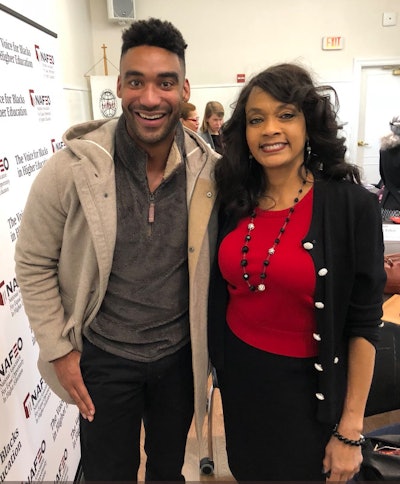A Capitol Hill roundtable hosted by the National Association for Equal Opportunity in Higher Education (NAFEO) convened a group of higher ed administrators, policymakers and change agents to give people of color a seat at the table in the current public debate about sexual assault and harassment.
During the “Title IX: Moving #MeToo from Agitation to Legislation” conversation, participants spoke about the cultural and economic impact of Black institutions, the Cleary Act and legislative and institutional policies that would ensure that historically Black colleges and universities (HBCUs) and schools that over time have become predominantly Black institutions (PBIs), can effectively support sexual-assault survivors and resolve instances of sexual misconduct on campuses.
 Dr. Lezli Baskerville with roundtable attendee Zeke Thomas.
Dr. Lezli Baskerville with roundtable attendee Zeke Thomas.While issues of sexual discrimination and misconduct are not exclusive to these schools, the solution must include them, Rep. Alma S. Adams, D-N.C., said in opening remarks. “A conversation without our input is not a conversation at all. Time’s up for our voices not to be heard.”
Serving as moderator, Dr. Julianne Malveaux – an economist, commentator and president emerita of Bennett College – began the discussion by acknowledging that the conversation around #MeToo must not ignore the context of patriarchy found in today’s society. But even so, sexual assault happens to men, too, she emphasized.
“This is a human problem,” said Zeke Thomas, a sexual violence-awareness activist. Thomas shared that people were not ready to talk about his story when he revealed that he had been sexually assaulted at the ages of 12 and 27, signifying that men survivors often are left out of the conversation.
“We have to redefine what love is,” he said about ending rape culture and sexual violence.
Malveaux, NAFEO president Lezli Baskerville and other roundtable participants added that the culture of unity and belonging at HBCUs can make it hard for students to report experiences of sexual misconduct at their schools.
Adonna Green, director of equity compliance at Bowie State University, said HBCUs and PBIs must take a different approach to handling Title IX issues because “students are often coming to us damaged” about who they are and how they fit into the world.
“There is no one way to handle these situations,” she said, adding that being mindful and sensitive is a first step to promoting environments where students feel comfortable reporting an incident or speaking to someone.
Participants discussed other challenges hindering progress in Title IX implementation at HBCUs and PBIs. For example, lack of funding, Title IX personnel and other resources for student support can result in lengthy Title IX investigations where a student complainant may still have to come in contact with the accused in classes or campus housing.
Dr. Jerry Blakemore, general counsel at the University of North Carolina at Greensboro, explained that his institution has a crisis response center and “victim advocate” staff who immediately provide support services and resources to a student even before the Title IX office is notified.
A “victim services” center or unit is “unheard of” in HBCU spaces, said Dr. Danielle Holley-Walker, dean of the Howard University School of Law. Until these resource needs are met, HBCUs and PBIs “will not provide a satisfactory Title IX environment,” she warned.
Addressing the economic impact of sexual violence, Anne Hedgepeth, vice president of public policy at the American Association of University Women, said effective Title IX policies must be in place at institutions to ensure that students who experience sexual discrimination or violence can complete their education. AAUW found that this was particularly important for women of color because this demographic takes longer to pay back student loans, which could lead to financial distress.
Hedgepeth’s suggested policies include schools asking their students about if they have experienced sexual misconduct. She also recommended that institutions pay attention to the “overlap of discrimination” that students may experience.
When institutional leaders do not fully hear or understand where students are coming from in regard to their personal experiences or the institutional handling of Title IX cases, there can be a disconnect, said Dr. Derryn Moten, chair of the department of History and Political Science t Alabama State University. Such was the case at Spelman and Morehouse colleges in Atlanta, where students started a public #WeKnowWhatYouDid campaign with the names of students accused of sexual assault.
“We’re not talking … we’re not having the conversations,” Moten said. “The conversations that students have on this matter are not the conversations that faculty have.”
He suggested HBCUs and PBIs have more “heart-to-heart” conversations and town hall meetings early on with students. Dr. China Wilson said she holds similar workshops at Trinity Washington University about healthy relationships, consent, bystander intervention and what constitutes sexual misconduct, among other topics.
Wilson added that leveraging the power of the wider community has proven effective in helping support her students who have experienced sexual violence.
In terms of LGBT students, HBCUs can partner with other well-established community centers to better support them, as the LGBT community experiences higher rates of sexual discrimination and harassment than other groups, said Sarah Warbelow, legal director of the Human Rights Campaign.
Baskerville said the roundtable was the first in a series of discussions engaging key leaders in thoughtful policy discussion on Title IX. Holley-Walker, of Howard, closed the discussion saying that the issue of sexual assault and harassment on HBCU and PBI campuses is not just another thing institutions have to fix.
“This is not a facilities issue, this is not a financial aid issue, it is not a curriculum issue,” she said. “These are people’s lives, and they’re being destroyed. If we don’t do better … we will be a part of the destruction of people’s lives.”
Tiffany Pennamon can be reached at [email protected]. You can follow her on Twitter @tiffanypennamon.



















